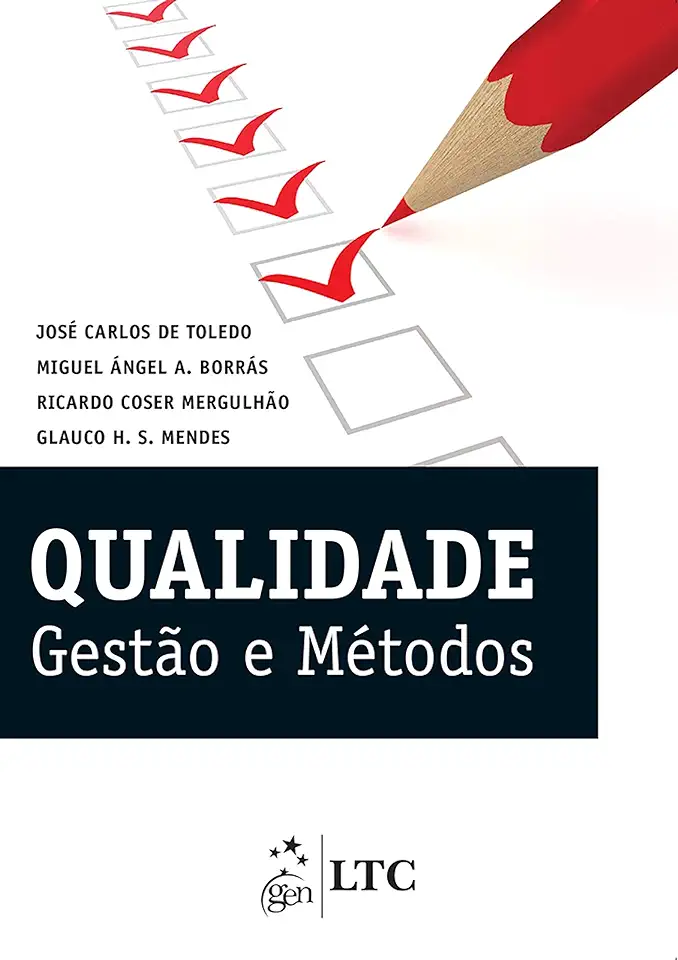
Quality. Management and Methods - José Carlos de Toledo
Quality Management and Methods: A Comprehensive Guide to Achieving Operational Excellence
Introduction
In today's competitive business landscape, organizations face the constant challenge of delivering high-quality products and services while optimizing efficiency and minimizing costs. To address these challenges effectively, a robust quality management system is essential. "Quality Management and Methods" by José Carlos de Toledo provides a comprehensive roadmap for organizations seeking to achieve operational excellence through effective quality management practices.
Key Features of the Book
Comprehensive Coverage: The book covers a wide range of quality management topics, from fundamental concepts and principles to advanced techniques and methodologies. It provides a holistic understanding of quality management, enabling readers to grasp the entire spectrum of quality-related issues and their impact on organizational performance.
Practical Approach: The book is grounded in real-world examples and case studies, illustrating how organizations have successfully implemented quality management principles to achieve remarkable results. These practical insights make the book highly relatable and applicable to various industries and business contexts.
Structured Organization: The book is meticulously organized into chapters, each focusing on a specific aspect of quality management. This structure allows readers to easily navigate the content and find the information they need quickly and efficiently.
Expert Insights: The book draws upon the author's extensive experience in quality management, providing readers with valuable insights and best practices from a seasoned professional. José Carlos de Toledo's expertise shines through in the depth of knowledge and practical guidance offered throughout the book.
Key Topics Covered
Quality Fundamentals: The book begins by establishing a solid foundation in quality management, covering concepts such as quality definitions, dimensions, and the role of quality in organizational success.
Quality Management Systems: Readers are introduced to various quality management systems, including ISO 9001, Six Sigma, and Lean Manufacturing. The book provides a detailed understanding of the requirements, implementation processes, and benefits of each system.
Quality Control and Assurance: The book delves into quality control techniques, statistical process control, and quality assurance practices. Readers gain the knowledge and tools to effectively monitor and maintain product and service quality.
Process Improvement: The book emphasizes the importance of continuous process improvement and introduces various methodologies, such as Kaizen, PDCA (Plan-Do-Check-Act) cycle, and DMAIC (Define-Measure-Analyze-Improve-Control).
Customer Satisfaction: The book highlights the significance of customer satisfaction and provides strategies for measuring, analyzing, and improving customer experiences.
Leadership and Quality Culture: The book explores the role of leadership in fostering a quality culture within an organization. It emphasizes the importance of employee involvement, empowerment, and teamwork in achieving quality excellence.
Benefits of Reading the Book
Enhanced Quality Management Knowledge: The book equips readers with a comprehensive understanding of quality management principles, systems, and methodologies. This knowledge empowers individuals to make informed decisions and implement effective quality management strategies within their organizations.
Improved Operational Efficiency: By applying the concepts and techniques discussed in the book, organizations can streamline their operations, reduce waste, and enhance overall efficiency.
Increased Customer Satisfaction: The book provides practical guidance on how to consistently meet and exceed customer expectations, leading to increased customer satisfaction and loyalty.
Competitive Advantage: A robust quality management system can provide organizations with a significant competitive advantage by enabling them to deliver superior products and services while optimizing costs.
Career Advancement: Quality management skills are highly sought after in various industries. By mastering the concepts presented in the book, individuals can enhance their career prospects and become valuable assets to their organizations.
Conclusion
"Quality Management and Methods" by José Carlos de Toledo is an invaluable resource for professionals, managers, and leaders seeking to transform their organizations through effective quality management practices. Its comprehensive coverage, practical approach, and expert insights make it a must-read for anyone committed to achieving operational excellence and delivering exceptional value to customers. Invest in this book and embark on a journey towards quality transformation that will drive sustainable success for your organization.